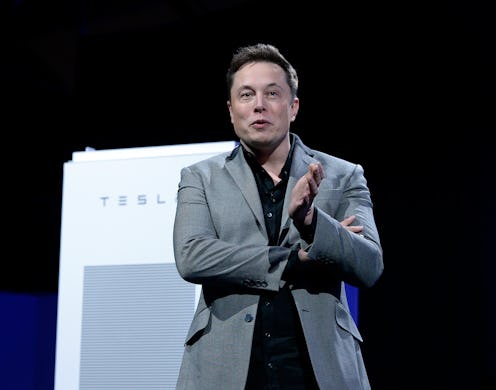News
Elon Musk: Sustainable Energy Should Be A Priority
During a visit with Late Show host Stephen Colbert on Wednesday, SpaceX CEO Elon Musk insisted that developing sustainable energy resources was the century's most pressing issue. The enigmatic entrepreneur and erstwhile boy genius spent the majority of his brief Late Show interview lightheartedly batting away suggestions that he was a super-villain (although, in Colbert's defense, Musk did say he would bomb the Martian poles with thermonuclear explosives to warm up the planet for habitation) and having a good laugh over the suggestive look of his Tesla Motors electric car charging device ("I would recommend not dropping anything when you're near it," he said of the snake-like arms). But when it came time to answer the big questions, Musk wasted no time getting his point across.
As the interview drew to a close, Colbert asked pointedly, "What do you think we need more than anything else?"
"Sustainable energy," Musk replied, without missing a beat.
Musk's own team at Tesla and his partners at Solar City (over which Musk presides as Chairman) are doing their very best to accomplish that feat already: In an April conference, Musk unveiled the former's "Tesla Energy" Powerwall plan, which would give the average citizen and business owner access to a myriad of different "power packs" — or in layman's terms, solar-charged cells that generate energy for cars, offices, and anything and everything in between.
Simply put, as Wired explained in May this year, if the typical power "grid goes down, you can still have power" thanks to your back-up, solar-charged Powerwall. It's a lofty concept, but just might be doable with Musk in charge.
"Our goal here is to fundamentally change the way the world uses energy," Musk explained at the April conference. "At the extreme scale."
Tesla isn't the only Musk-backed company digging in the direction of solar energy either. The eco-friendly Solar City, founded in 2006, has spent the majority of the last nine years finding ways to improve upon the awkward solar panel models of old. In June last year, Musk and Solar City founders Lyndon and Peter Rive announced in a blog post that the company had signed an agreement to acquire the California-based Silevo, "a solar panel technology and manufacturing company" whose panels had "demonstrated a unique combination of high energy output and low cost."
"Our intent is to combine what we believe is fundamentally the best photovoltaic technology with massive economies of scale to achieve a breakthrough in the cost of solar power," they wrote. "We absolutely believe that solar power can and will become the world’s predominant source of energy within our lifetimes, but there are obviously a lot of panels that have to be manufactured and installed in order for that to happen."
Despite the slow build-up, Musk, Tesla, and Solar City all have one thing in common that boosts them far above their competitors: They desperately want things to change, and they're willing to put in as much exhausting work as it takes to get the job done. And despite the fact that they've got a giant hurdle to overcome — that is, manufacturing some 2 billion Powerwall power packs in order to adequately meet the planet's growing energy needs — they're calmly taking everything in stride.
"We’re talking about trying to change the fundamental energy infrastructure of the world," Musk told conference attendees in April. "This is within the power of humanity to do. ... We have done it before — it is not impossible."
